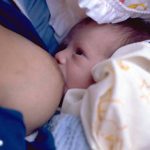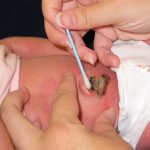- Citas Centro Médico de Caracas: Lunes, Miercoles y Viernes. Pulse el botón Agende una Cita
- Sistema de citas en linea exclusivo para Centro Medico de Caracas en San Bernardino
- Citas CMDLT: Jueves. llamar al 0212-9496243 y 9496245
- Las Emergencias son atendidas en CMDLT previa coordinacion personal al 04142708338
- Proveedor Seguros Mercantil y Sudeban

Are we doing it right?
Well I will tell you for your peace of mind that most of the time they are doing well. Independent of races, creeds, cultures, social position, etc., there exists in the mother-child binomial a learning, call it sixth sense, intuition, instinct, that faster than you imagine, without mediating exchange of words enough communication to achieve the well-being of the healthy newborn.
The healthy newborn is a being in permanent evolution to which it is necessary to provide all the conditions that allow its growth and development to the maximum of its potential.
As a main condition is the love that must always be present in all its surroundings and that must receive it in the way it is spoken, caressed, loaded and cradled, fed, and in all body contact that is provide
Another important condition is to protect your health . The newborn does not have enough defenses against infections since he receives them through breastfeeding, and progressively develops his own. Certain actions are imposed to produce this protection, actions that consist mainly of the following: careful washing of the hands before and after handling, all your clothes must be very well washed even if it is new, what falls on the floor should not enter Contact with the baby or his bed. People with some type of discomfort or infection whether viral or bacterial should not be in the area where the baby is. If it is essential that this person is, you must protect your nose and mouth with a mask. Avoid unnecessary exits, and less to places with crowds of people.
Any doubt or signs such as lack of appetite, little activity, persistent crying, frequent vomiting, body temperature under 36.4 ° C or over 36.8 ° C measured in the rectum with rectal thermometer, should be immediately reported to the Pediatrician.
DR. VÍCTOR M. PADULA FALCI
Pediatrics – Neonatology
Private Hospital Medical Center of Caracas
The most pressing: the feeding of the Newborn

There is no doubt that breastfeeding is the best nutrition for the newborn. There are innumerable scientific studies that prove it. Therefore, it is desirable that all newborns receive exclusive breastfeeding for as long as the mother WANTS AND CAN. However, there are certain requirements that will favor the success of breastfeeding.
The first of all is the mother’s desire to breastfeed , and that must be desire. Not an imposition or feel obliged to do so since it will surely be tense, nervous, annoying, situations that will block or significantly decrease your milk production. On the other hand, when you are calm, fulfilling your wish, your production potential will be maintained and the sum of the other requirements, as we will see below, you should not doubt that your baby will receive all the benefits of breastfeeding.
The second requirement (I note that the order to raise the requirements does not mean more or less important EVERYTHING are of equal importance) is to breastfeed on demand , this means every time the newborn asks, not try to make a schedule in the first weeks , the newborn himself will give the guideline so that according to his digestive physiology he is making his schedule. How to know when you are hungry ?. Will wake up, showing signs of some discomfort without reaching the crying (should not be crying because it means that hunger began time before crying and this prevents him from making his schedule), if he is awake, when carrying the mother will look for breast position, or when rubbing the corners of the lips or the nasolabial space will open the mouth or move the head in the form of a search. In those moments, give him chest.
Sit in a comfortable chair. No chest lying down, since you can fall asleep with the consequent risk to the newborn, or if you need to mobilize it is more difficult in that position.
Be dressed fresh and in comfortable clothes, unbutton the newborn a bit so that it is also cool and comfortable. They do not sweat . The heat for them is oppressive, they get depressed, they fall asleep and they do not eat. And the sum of the heat of the maternal body, the one generated by the suction, and by overbreaking, causes it to fall asleep, does not eat and, when it is barely refreshed because it is lying down, it wakes up and, of course! ask to eat.
What is described is one of the most frequent causes of derangement in the breastfeeding schedule and in the despair of the mothers who are putting all their effort into breastfeeding and see that things do not work for her. This is where the thoughts that generate emotional situations of tension, nervousness, that influence the decrease of milk production appear. Thoughts like: I have almost no milk. He is not satisfied, my milk is bad. I am not feeding him … .. if we add to this the bombardment of information from family and friends, who with the best intention try to help but give information that most of the time instead of reinforcing breastfeeding weakens it, being one of the frequent information to give infant formula, the emotionality-disinformation circle closes.
Allow to clarify the following: when giving infant formula the newborn is the safest to accept and eat an amount that can seem a lot (3-4 ounces) and sleep or late more to ask to eat, both things make the mother believe the reason in his thoughts. But it is not like that at all. It undoubtedly produces less milk because it is mentally blocked and therefore the newborn is dissatisfied. If you are not blocked and apply the next requirements that we will explain, you will produce enough to leave your baby well nourished and satisfied.
Another point to clarify is the question of “being satisfied” . The newborn is “dissatisfied” with breast milk because she does not need to stop in the stomach to be digested. Rapid passage to the intestine, where its nutrients are digested and absorbed and the sensation of hunger appears when the stomach is empty for a relatively short time. This is why it can be given on demand since it does not interrupt digestion.
Infant milk formulas, which are based on cow’s milk, need to be digested in the stomach, for this they become a rennet of milk that slowly passes to the intestine and leaves the stomach full for much longer so the sensation of hunger takes longer to appear, without this meaning in any way that is better nourished, and should not occur on demand because they interrupt gastric digestion leading to the possible appearance of digestive disorders.
Proof of the different digestive processes are regurgitations or swishes . Those of breast milk have no smell and are somewhat thicker than breast milk because they are accompanied by normal gastric secretions. Milk formula infant mouths smell like cut milk and are lumpy .
Let’s move on to the third requirement: when is breastfeeding begun ?, it begins as soon as the mother is in conditions after delivery. In the first feeding you will receive the Colostrum, very rich in proteins, and antibodies which the newborn lacks. Progressively in the first days will appear breast milk with all its properties. There is a belief that waiting for the “lowering of milk”, consisting of increased breast volume, sometimes painful and hard, to start breastfeeding. False. The milk does not come down from anywhere, it is made in the breast when the newborn stimulates the maternal nipple with its suction. This is caused by that stimulus that travels via the nervous system to the pituitary gland a first hormone called Prolactin, responsible for the manufacture of breast milk in the breast that is filling the ducts thereof, called galacto- dian ducts and the being full and distended, they also produce a stimulus which causes a second hormone called oxytocin to be produced, which acts on small muscles that surround the galactoferial ducts, contracting them and emptying their contents through the nipple in the infant’s mouth. When this happens the mother may feel pain in the womb, such as uterine contractions, being the best proof that the manufacture and delivery of breast milk is being adequately fulfilled. As for the increase in breast size, accompanied by pain or fullness, in the first 72 hours after delivery it is not milk. It is inflammation, which is responsible for the discomfort to start breastfeeding and can be avoided by initiating breastfeeding, as was said, as soon as possible after delivery.
The fourth requirement has to do with the time of breastfeeding at each meal. The mother has to recognize the three stages that make up each feeding. The first stage will notice that the newborn grasps the nipple eagerly, sucks hard causing the nipple to stretch and that is what will produce the stimulus for the production of Prolactin. This stage varies from one newborn to another but usually lasts 2 or 3 minutes. The second stage begins when the breast has already made the milk, the ducts are dilated, and the stimulus that will release the oxytocin is produced. At the moment the suction becomes softer, begins to swallow the milk that the breast itself empties in its mouth. This stage can last up to 15 minutes and its end is known because the newborn falls asleep. Release the nipple, or start the strong suction again. If it is the latter, it is time to alternate the breast and let the aforementioned stages be fulfilled. The breasts can alternate the necessary times to leave the baby satisfied. If the mother feels thirsty when she is lactating, she means that she should drink more water , even when she is lactating . The thirst is given by dehydration to produce milk, and if it is not corrected, the amount to produce decreases. This decrease can be noted by the decrease in urine production of the newborn. If the wet diaper changes decrease, if the urine leaves a shadow on the diaper, it is probably due to a decrease in the intake of breast milk.
Should situations arise that make exclusive breastfeeding impossible, they should be discussed with the Pediatrician before making decisions about it
Care of the Navel and fall of the Umbilical Cord

It should be cleaned at each change of diaper using a commercial applicator, cotton, wet in Absolute or 70 ° Alcohol. The cleaning consists in rubbing the existing groove between the cord and the skin of the future umbilical scar (navel) for this it is necessary to mobilize the umbilical cord WITHOUT FEAR to introduce the applicator in the entire circle of the groove, continue with the cord, and finalize with the skin outside the furrow. Each with different applicators. After cleaning the umbilical cord is covered only by the diaper or the shirt. How long to clean it in that way ?, Until it falls, then it continues cleaning the umbilical scar by introducing the wet applicator in alcohol, for the days that afternoon in healing well.
Bathing and skin care

The newborn needs to be bathed every day in order to keep his skin fresh, even if the umbilical cord has not fallen. The water must be boiled , cooled to room temperature , and the newborn must be supported so that the bath is not immersed . The water must run, not stagnate, both for soaping and for rinsing. Use own soaps for newborns, soaping most of all the folds. Shampoo can be used for your hair, for children’s products. The rinsing should be careful, leaving no soap or shampoo residue. Dry more by pressing the towel against the skin than rubbing , and pay special attention to drying the folds to prevent accumulation of moisture, which would facilitate irritation.
The umbilical cord should be dried very well and alcohol should be applied as explained in the corresponding section. It is not necessary to use talc, lotions, perfumes or creams.
The skin of the newborn presents certain characteristics that should be a reason for orientation for its interpretation. I am going to refer to three entities that statistically are the most frequent in the healthy newborn. From the third day of birth, a yellowish coloration may appear on the skin, especially on the face and trunk, without being intense. This corresponds to the so-called physiological , benign jaundice , which is due to the natural destruction of the red blood cells and the transient deficiency of the liver to metabolize the products left free by the destroyed red blood cell. It is frequent and corrects itself. Jaundice from breastfeeding , which is caused by a hormone present in the milk of some mothers that competes with the liver function called conjugation, is less frequent but also benign. In both, the pigment that dyes the skin is bilirubin. The third occurs from the second or third day of birth: lesions that resemble insect bites or allergic reactions may appear. They can be few or multiple and are distributed mainly in the trunk and extremities. They appear and disappear several times in a single day until they gradually stop appearing. No treatment is applied.
If you follow this link you can read an article about the most frequent skin conditions of the baby
The dream

Sleep time varies from one newborn to the next. From birth to your first month of age there are variations that relate to your intrauterine life. If the activity was more during the day, if it was during the night, or if it was shared, it will continue to be that way and you should not try to change it. You should not wake up to eat. The digestion time of a newborn has an average of three hours. If you sleep more than four hours, try to wake him slowly, touching him and speaking softly with his natural tone of voice. If he wakes up, try to breastfeed him . The sleeping position should be face up, in this position your chest expands effortlessly and symmetrically facilitating breathing. Babies must sleep on their backs
Vaccination

The creation of groups that do not believe in vaccines and refuse to be applied to their children violate their rights to choose since a baby or a child is not able to do so.
Refusing vaccination not only increases the individual risk of suffering from an illness but exposes the community to suffer it too; delay it, exposes the individual to suffer the disease at a time where the complications would be more severe: it is known that diseases such as measles or varicella in adults are very dangerous and more risky to generate rare lethal complications in childhood
As a result of the substantial success that vaccines have had in reducing diseases preventable by their use, the memory of the severity of these diseases has vanished from popular memory, making the risk perceived by vaccination greater than that caused by disease. The most frequent causes for refusing to vaccinate children are related to doubts about the safety of vaccines, the little concern caused by the vague memory of the severity of the original diseases and a growing belief in “naturist” methods without demonstrable benefits in many cases. Smallpox was eradicated from the planet so effectively that no one remembers it anymore and does not need to use its vaccine.
If the enormous benefits that vaccination has given to society are to be maintained, we must make efforts to educate the public about these benefits and increase the public’s confidence in the control mechanisms that guarantee the safety of vaccines in current use.
Physicians have a responsibility to adequately educate our patients, eliminating false beliefs and providing verifiable evidence about the irrefutable benefits of preventive vaccines.
Myths
Should I take oatmeal, malt, abundant rations to increase milk production?
False.
The production increases and it maintains when consuming abundant liquid, the water is ideal and does not get fat.
After feeding the newborn, do not lie down until you “get the gas”?
False.
If there is no air in the stomach the newborn will not expel gases through the mouth, is unlikely to generate gas while breastfeeding. The air that is in the stomach is ingested when it cries. If you have eaten, you can hold it in a semi-sitting position in your mother’s lap, where it will easily expel in a few minutes the air that you may have in your stomach, with the advantage of being able to see your face, talk to you, realize if you regurgitate and be able to help you. If you do not expel gas through your mouth in that way, it is because you did not have gas in your stomach or passed into the intestine and it will be expelled through the rectum. It is not necessary to place the newborn against the shoulder and hit his back to expel gas, it is likely that regurgitate part of what he has eaten, being pressed his abdomen.
If you do not evacuate every day, do you have to encourage him to do it?
False.
The newborn breast-fed can go to extremes. Evacuate several times a day, or spend more than 24 hours without evacuating, and both are normal. If you spend more than 24 hours without evacuating you can stimulate by flexing your legs on the abdomen and keeping them in that position, which will push the baby to stretch and is very likely to evacuate. If it is not achieved in this way, it can be stimulated with a child glycerin suppository, never with a thermometer. The evacuation of the newborn is almost liquid, yellow gold, sometimes changes according to the maternal diet, without strong odor.
Is it necessary to give water to the newborn if he only receives the breast?
False.
If you receive breastfeeding, urinate in sufficient quantity, and the urine leaves no mark on the diaper is because you get enough fluid by breastfeeding.
In case it deserves to receive water (a lot of heat, formula teapots), it must be boiled even if it is potable, without any type of addition, and never give infusions, cereal or vegetable water.